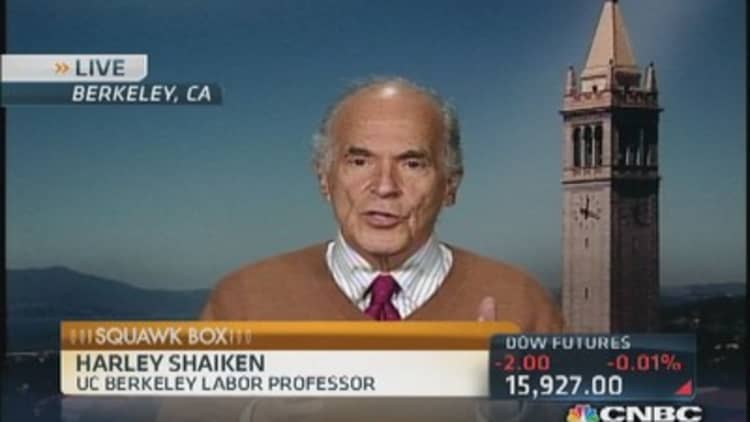
As a nasty winter storm rolls through the Southeast, another one is coming to a climax in Chattanooga, Tenn.
It involves workers at the the city's Volkswagen plant and whether they will elect to join the United Auto Workers union.
More than 1,500 hourly wage workers at Volkswagen Chattanooga will vote on the question via secret ballot Wednesday through Friday night. The National Labor Relations Board is conducting the vote and will be in charge of deciding when to release the results, which will most likely come this weekend.
It's the closest the UAW has come to organizing an auto plant for a foreign brand in 27 years, following many failed attempts.
(Read more: Union vote in Tennessee could be labor rally point)
"I think we could well see a unionized Volkswagen, a successful Volkswagen, and if that is the case I think you will be looking at workers and perhaps even firms at other automakers in the South perhaps moving down this road," said Harley Shaiken, a professor of labor relations at the University of California, Berkeley.
Workers supportive of the UAW say they believe it would give their plant a greater say in plans involving Volkswagen.
Mike Cantrell, who has worked for Volkswagen for almost three years, said joining the UAW will give workers an opportunity to express concerns and ideas for improvement.
Richard Isbell, who was the 800th worker hired at VW Chattanooga, is also voting for inclusion in the UAW.
"I want us to have a voice in [the company's] Global Works Council," he said. "I want us to be able to bring more products, more cars here to Chattanooga."
(Read more: Worker wage hike: What we went on strike for)
But plenty of people—from politicians to conservative activists—are actively urging workers to reject the UAW. Their general feeling is that unions make companies less competitive.
Sen. Bob Corker, a Republican, is one of many Tennessee politicians saying that employees' unionizing in a right-to-work state would send the wrong message.
Grover Norquist, president of taxpayer advocacy group Americans for Tax Reform, said that joining the UAW would contradict the deal made when lawmakers persuaded Volkswagen to set up the Tennessee plant.
"When Volkswagen went to Tennessee they got $500 million or more of taxpayer dollars with a promise that they wouldn't throw in and bring the UAW to Tennessee," he said.
"This is one of those unique situations where VW has allowed the UAW to have unfettered access to its facilities," said Maury Nicely, who represents the anti-union group Southern Momentum.
"At the same time," he added, "other groups with competing viewpoints have not been allowed access. Supervisors have been told they cannot share their viewpoints or their experiences with their workers, and workers have been told when meeting with the UAW, 'You're not allowed to ask questions.' "
The UAW said it has called for outsiders not to interfere in the vote of VW workers. Volkswagen itself has maintained a neutral stance on whether its workers should join the union.
(Read more: Small auto brands steal spotlight from the big guys)
The United Auto Workers, while still a force in the upper Midwest, is far smaller than it was in its heyday in the 1970s. The UAW had 1.5 million members in 1979, but steadily lost membership as the Big Three automakers lost market share and began to close plants.
The union tried to reverse the trend by attempting to organize new assembly plants by foreign automakers. Despite continual talk of finally breaking through, the UAW never succeeded in organizing a Toyota, Honda or other foreign brand plant.
The biggest hit to membership rolls came between 2007 and 2009, when General Motors, Ford and Chrysler shut down plants and shed workers as industry sales plunged in the aftermath of the financial crisis. By 2009, the UAW was down to 355,191 members.
But just as the Detroit Three have gradually added second shifts at plants and ramped up hiring, so UAW membership has risen. It stood at 382,513 at the end of 2012.
Now, as the Volkswagen workers cast their ballots, the vote's significance cannot be overstated, said Shaiken at UC Berkeley.
"I think this is going to be a very important model," he said. "There is a lot of attention on it, and what is at stake is not simply a unionized plant but a new way for U.S. firms to compete in the U.S. economy."
—By CNBC's Phil LeBeau. Follow him on Twitter @LeBeauCarNews.
Questions? Comments? BehindTheWheel@cnbc.com.


